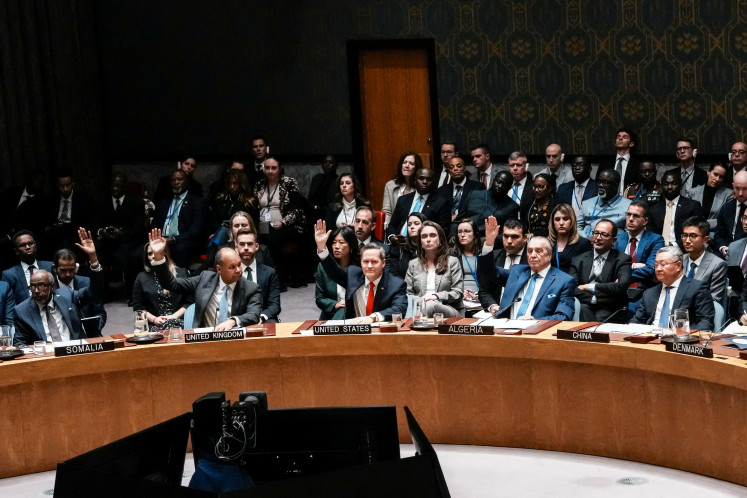Popular Reads
Top Results
Can't find what you're looking for?
View all search resultsPopular Reads
Top Results
Can't find what you're looking for?
View all search resultsHow yuan’s depreciation affects the world, Indonesia
The world’s monetary markets are undergoing turmoil, and the United States-China trade war is escalating
Change text size
Gift Premium Articles
to Anyone
T
he world’s monetary markets are undergoing turmoil, and the United States-China trade war is escalating. The situation was triggered by the latest People’s Bank of China (PBOC) policy, which depreciated the yuan on Aug. 5. The currency had plunged to its lowest point. According to The Wall Street Journal, one US dollar amounted to over 7.10 yuan.
The move was reportedly made in response to US President Donald Trump’s threat that Washington would impose a 10 percent import tariff on Chinese products, amounting to US$300 billion, starting on Sept. 1.
The public reacted to the yuan’s depreciation by selling off global shares. In an offshore market, $1 was traded at 7.0949 yuan, and after changing hands in an onshore market, $1 was traded at 7.0507 yuan. In an onshore market, the yuan was allowed to move in a band that was able to fluctuate 2 percent from the reference rate.
There was some debate between economists and traders over whether the yuan’s weakening was deliberately made by Beijing as a weapon in the trade war. Wall Street brokers fled their stocks and other assets they thought would be badly impacted if the US-Chinese trade war continued to escalate. That Wall Street phenomenon then spread to other global exchange markets until Monday afternoon.
Indexes at the Dow Jones Industrial fell 900 points or 3.4 percent, the S&P 500 fell by 3.5 percent and the NASDAQ tech composite decreased by 4 percent.
Most analysts think that the US and China will have to make a trade deal. China has employed its currency as a weapon, and it is predicted that the weapon will trigger another currency war with the deliberate weakening of the yuan to strengthen the competitiveness of its exports.
Chinese officials have not denied that interpretation. In fact, the PBOC officially stated that the yuan’s depreciation was due to the impact of unilateralists’ reactions and a balancing measure of protectionist policies in trade.
PBOC Governor Yi Gang said the yuan “was not specifically regulated at a certain level”. That statement became crucial as the yuan’s weakening would probably continue in the following days. It was also a stern warning that the yuan’s devaluation weapon could be activated at any time.
The yuan might fall below its fundament for the purpose of that warning. Moreover, it might result in the low prices of Chinese products all over the world and, eventually, increase the world’s trade imbalances.
But the yuan’s deliberate depreciation could backfire at Chinese products. Abundant supplies of Chinese products due to their low prices would create the global impression that Chinese products are of poor quality. Moreover, Chinese importers would feel unsatisfied with their own government, since the prices of imported products would get more burdensome and domestic debtors would have difficulty paying their business debts in US dollars because US dollars would be expensive.
The US-China trade war will continue and enter the next episode, namely a currency war. The change will have a greater impact on and hurt not only the US and Chinese economies but also the global economy. Some experts predict that if the currency war continues to take place, it may lead to three scenarios.
First, the US may respond to it by extending higher tariffs on Chinese products.
As a result, the prices of Chinese products in the US would be more expensive and China would respond by further devaluating its yuan. Consequently, the prices of Chinese products in the US would continue to be low.
In parallel, many Chinese products would flood other markets, such as in Asia and Africa. As a result, China would be the world’s biggest producer, and the US would have to concede defeat and become the world’s second-biggest economy. The global economy would continue to be stable.
Second, like the first scenario where the US extends its import tariffs and develops anti-Chinese sentiments in Asian and African countries, China may foster a negative image in the international community.
Third, the US and China may make peace. Both of them could make a rational trade deal, so globalization would thrive and the US would still be the world’s biggest economy.
In the middle term, a weak stock exchange due to selling-off activities made by Wall Street investors may benefit Indonesia, since it is possible for those investors to move their investments to other Asian stock markets. This includes Indonesia, a safe haven for global investors taking their short-term profits, since the yield rate in Indonesia is the highest of all Asian countries.
However, the domestic economy cannot benefit from the investments too much because the incoming portfolio capital must be compensated for with high interests rates.
Even if the rupiah appreciated due to those heavy capital inflows, it would be more difficult for Indonesian export products to be competitive. The current account deficit would increase.
Indonesia must have an economic design capable of anticipating the yuan’s devaluation and the US-Chinese trade war. We can see the evidence from the fact that the rupiah is highly vulnerable to external shocks. Policymakers must ensure the stability of the rupiah against any external turmoil through creative economic decisions.
The currency is a double-edged sword that must be controlled by the economy’s strong fundamentals.
___________________________
Fadhil Hasan is chairman of Bank Indonesia’s supervisory board and Achmad Nur Hidayat is an analyst for the supervisory board. The views expressed are their own.









